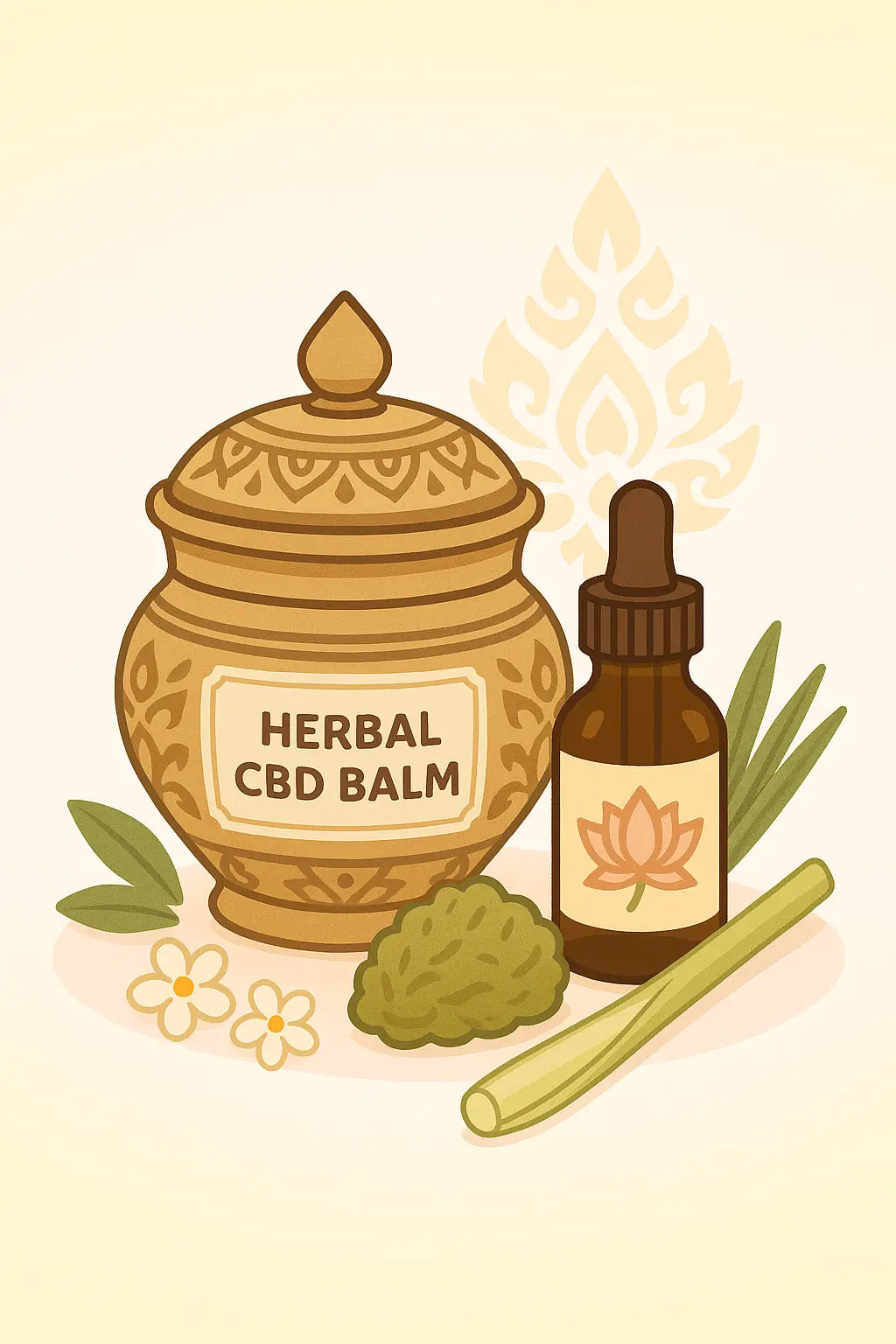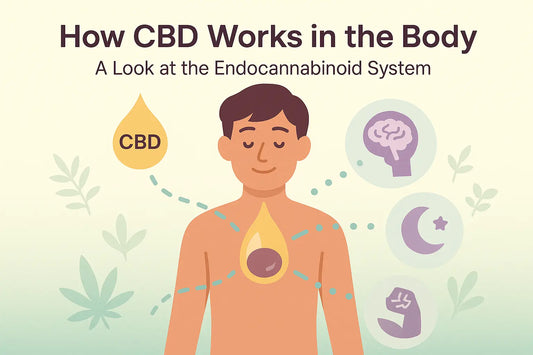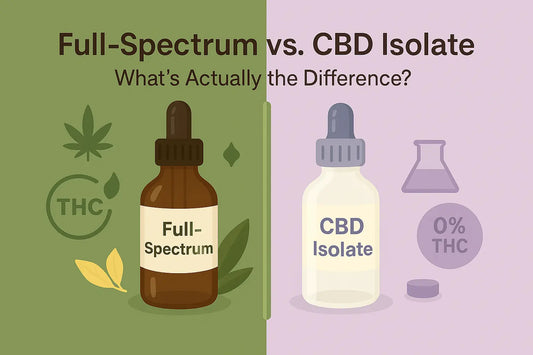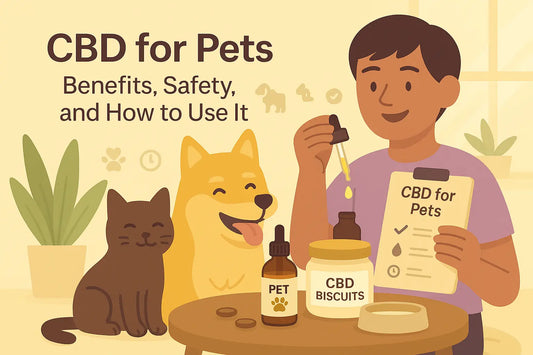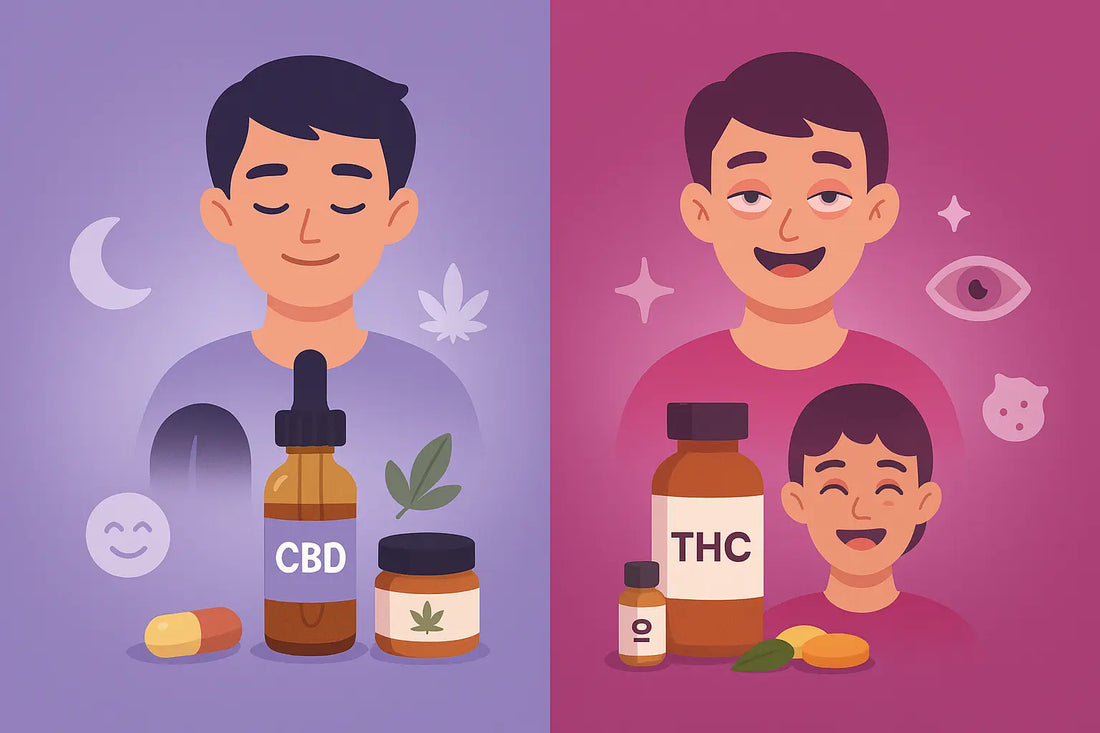
CBD vs THC: Key Differences Explained
Cenk CetinShare
Introduction
CBD and THC may come from the same plant, but they couldn’t be more different in how they affect the body and mind. While one is celebrated for its calming, non-intoxicating properties, the other is known for its euphoric high. But which one is right for you? Whether you’re looking for relaxation, relief, or a little bit of both, understanding the differences between these two cannabinoids is key. This guide unpacks everything you need to know—so you can choose wisely and get the most out of your cannabis experience.
Key Takeaways
- CBD and THC affect the body differently—THC causes a high, while CBD does not.
- THC binds to CB1 receptors, leading to euphoria and altered perception.
- CBD interacts differently, offering therapeutic benefits without intoxication.
- THC helps with pain and nausea; CBD aids anxiety and inflammation.
- THC has stronger side effects, while CBD’s are milder.
What Are CBD and THC?
Cannabis is packed with natural compounds called “cannabinoids,” which interact with the body’s endocannabinoid system (ECS) to influence mood, pain, sleep, and more. Among the many cannabinoids, CBD (cannabidiol) and THC (tetrahydrocannabinol) are the most well-known and widely studied.
THC is the main psychoactive component in cannabis, causing the intoxicating "high" commonly linked to its use. It binds directly to CB1 receptors in the human brain, leading to euphoric and mind-altering effects.
CBD, on the other hand, is non-intoxicating—meaning it does not make you feel high when consumed. Instead, it interacts with CB1 and CB2 receptors in a way that helps regulate pain, stress, and inflammation. This makes CBD a favored option for those wanting the therapeutic effects of cannabis without the intoxicating high.
Chemical Structure and How They Work
CBD and THC consist of the same molecular components—C₂₁H₃₀O₂: their structural arrangement varies, causing them to affect the body in distinct ways. This small difference in structure affects the way they engage with the endocannabinoid system (ECS) and its receptors.
-
THC binds directly to CB1 receptors in the brain, which triggers psychoactive effects, producing the characteristic “high” associated with cannabis.
- CBD has a weaker affinity for CB1 receptors and instead modulates their activity, which is why it doesn’t cause intoxication. It also interacts with CB2 receptors, which are more involved in immune function and inflammation.
- Because of these differences, THC is responsible for euphoria and altered perception, while CBD offers potential therapeutic effects without the mind-altering experience.
Psychoactive Effects: THC vs. CBD
A key difference between THC and CBD is their impact on the mind.
-
THC is psychoactive, meaning it produces the “high” associated with cannabis. It binds strongly to CB1 receptors in the brain, leading to euphoria, altered perception, and cognitive changes like increased creativity or impaired memory. Higher doses can sometimes cause anxiety or paranoia in sensitive individuals.
- CBD is non-intoxicating and does not create a high. Instead, it interacts indirectly with cannabinoid receptors, potentially counteracting THC’s psychoactive effects. CBD is often linked to calmness, relaxation, and improved focus without altering perception or mental clarity.
While THC directly influences mood and cognition, CBD is valued for its ability to support balance and well-being without impairing mental function.
Medical Benefits and Uses
Both THC and CBD offer therapeutic benefits, but their effects and application differ.
THC is widely used for:
-
Pain Relief – Helps with chronic pain, neuropathy, and muscle spasms.
-
Nausea Reduction – Commonly prescribed for chemotherapy-induced nausea.
- Appetite Stimulation – Beneficial for conditions like cancer or HIV/AIDS that cause appetite loss.
CBD is valued for:
-
Anxiety and Stress Relief – May help reduce social anxiety, PTSD, and general stress.
-
Anti-Inflammatory Properties – Used for conditions like arthritis and inflammatory disorders.
- Seizure Reduction – Approved for treating epilepsy, particularly in Dravet syndrome and Lennox-Gastaut syndrome.
Overlapping Benefits & Key Differences
Both cannabinoids can assist with pain, inflammation, and sleep problems, but THC produces more intense psychoactive effects, whereas CBD is favored by those wanting relief without feeling intoxicated. Some medical treatments combine both compounds to maximize their therapeutic potential.
Side Effects and Safety
While CBD and THC offer therapeutic benefits, they can also cause side effects, which vary in intensity.
Common Side Effects of THC
THC’s psychoactive nature can lead to:
-
Paranoia or Anxiety – Higher doses may trigger anxious thoughts or paranoia.
-
Dry mouth and Red Eyes – THC reduces saliva production, leading to cottonmouth.
-
Increased Heart Rate – May cause discomfort, especially for those with heart conditions.
- Impaired Coordination and Memory – Can temporarily affect reaction time and cognitive function.
CBD’s Milder Side Effects
CBD is generally well-tolerated, but some users may experience:
-
Drowsiness – Higher doses can lead to relaxation or sleepiness.
-
Dry Mouth – Similar to THC, CBD may decrease saliva production.
-
Changes in Appetite – Some report increased or decreased hunger.
Legality and Accessibility
Cannabis laws in Thailand have undergone significant changes, but regulations still vary depending on the THC content and intended use.
THC Legality in Thailand
-
THC remains highly regulated under Thai law.
-
Cannabis was decriminalized in 2022, but products containing over 0.2% THC are still classified as narcotics and illegal for recreational use.
- Only licensed businesses can legally sell THC products for medical or research purposes.
CBD Legality in Thailand
-
CBD is legal in Thailand as long as it contains less than 0.2% THC.
-
CBD-infused products, such as oils, edibles, and cosmetics, are available with proper registration and approval from the Thai FDA.
- However, importing or selling CBD without authorization is still restricted.
Checking Local Laws
- Laws continue to evolve, so it’s crucial to stay updated on new regulations.
- Travelers should be cautious as bringing cannabis products into Thailand without permission may lead to legal consequences.
- Purchasing from licensed dispensaries ensures compliance with Thai regulations.
Although Thailand has become more accepting of cannabis, it's crucial to be aware of local laws to prevent legal complications when using CBD or THC products.
Ending
While CBD and THC both come from cannabis, their effects and uses differ significantly. THC is known for its intoxicating high and pain-relieving properties, whereas CBD provides therapeutic benefits without altering perception. Whether you’re looking for relaxation, symptom management, or a combination of both, understanding these cannabinoids helps you make informed choices. By considering your personal needs and staying aware of legal regulations, you can confidently navigate the world of cannabis.
